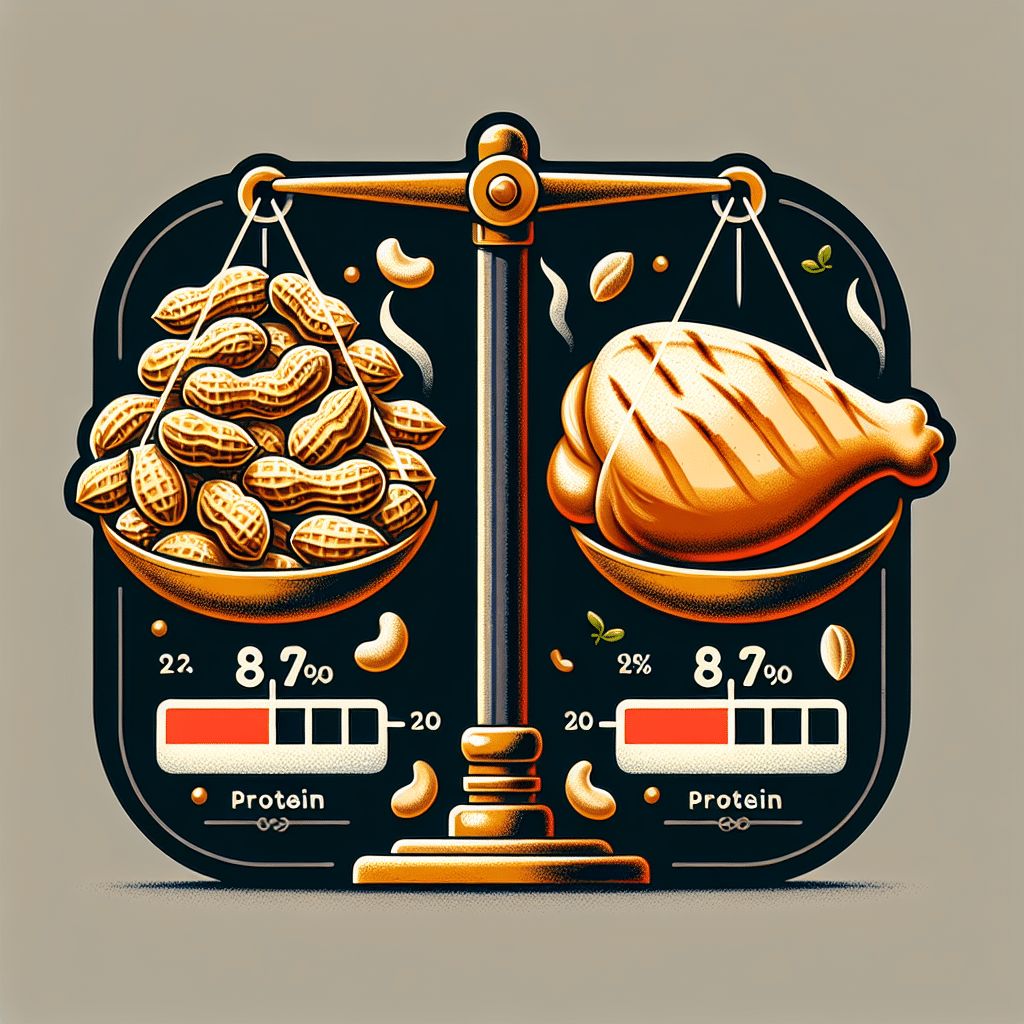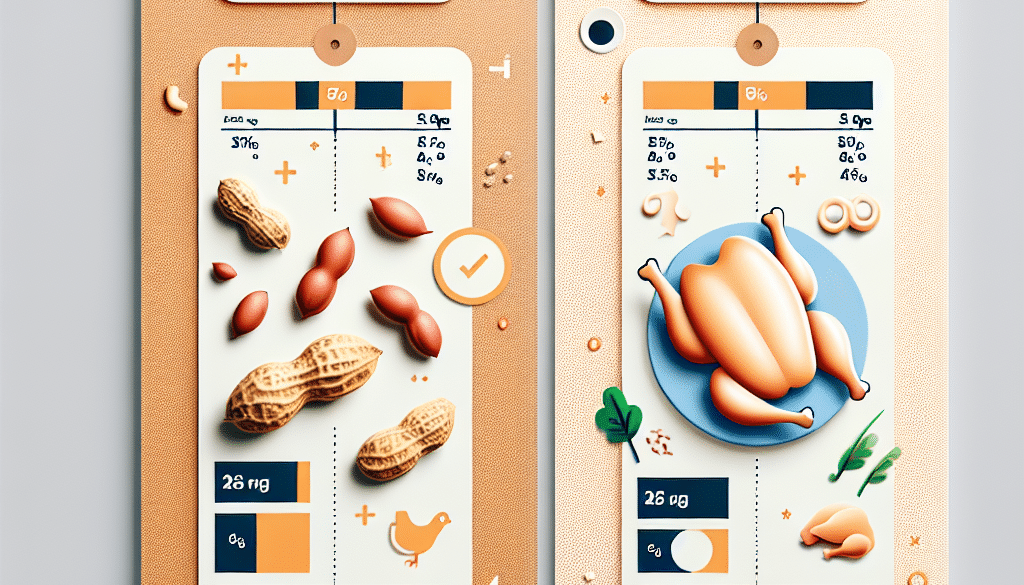Does Peanut Have More Protein Than Chicken?
-
Table of Contents
- Peanut vs. Chicken: A Protein Showdown
- Understanding Protein in Our Diet
- Protein Content: Peanuts vs. Chicken
- Nutritional Profiles Beyond Protein
- Protein Quality and Digestibility
- Health Implications and Dietary Considerations
- Conclusion: Balancing Protein Sources
- Discover ETprotein’s High-Quality Protein Products
Peanut vs. Chicken: A Protein Showdown

When it comes to protein sources, chicken has long been a staple in many diets, recognized for its lean quality and high protein content. However, peanuts, a legume with a rich nutritional profile, have also been touted for their protein content. This article delves into the comparison between peanuts and chicken, examining which one packs more protein and the implications for your diet.
Understanding Protein in Our Diet
Protein is a macronutrient essential for building muscle mass, repairing tissues, and producing enzymes and hormones. It’s a vital component of every cell in the body, and getting enough protein is crucial for maintaining good health. While animal sources like chicken are well-known for their high protein content, plant-based sources such as peanuts are gaining popularity, especially among those following vegetarian or vegan diets.
Protein Content: Peanuts vs. Chicken
To accurately compare the protein content of peanuts to chicken, we need to look at the numbers. Here’s a breakdown of the protein content in both foods:
- Chicken: A 100-gram serving of cooked chicken breast contains approximately 31 grams of protein.
- Peanuts: A 100-gram serving of raw peanuts contains about 26 grams of protein.
At first glance, chicken appears to have a higher protein content. However, it’s important to consider other factors such as the form in which these foods are typically consumed and their overall nutritional profiles.
Nutritional Profiles Beyond Protein
While protein content is a significant factor, the broader nutritional value of each food source should also be considered:
- Chicken: Besides being a great source of protein, chicken is also rich in B vitamins, particularly niacin and B6, which are important for energy metabolism and cardiovascular health. It’s also a good source of minerals like selenium and phosphorus.
- Peanuts: Peanuts not only provide protein but are also high in healthy fats, primarily monounsaturated and polyunsaturated fats, which are beneficial for heart health. They are also a good source of antioxidants, vitamins like biotin and vitamin E, and minerals such as magnesium.
When considering these nutritional profiles, it’s clear that both chicken and peanuts offer unique benefits beyond their protein content.
Protein Quality and Digestibility
Another aspect to consider is the quality of protein. Animal proteins like chicken contain all nine essential amino acids, making them complete proteins. Peanuts, while rich in protein, do not contain all essential amino acids in sufficient quantities and are therefore considered an incomplete protein.
However, the concept of protein combining, where different plant-based proteins are eaten together to provide all essential amino acids, can make peanuts part of a complete protein diet for vegetarians and vegans.
Health Implications and Dietary Considerations
Choosing between peanuts and chicken for protein can depend on various health and dietary considerations:
- Weight Management: Peanuts are calorie-dense due to their high fat content, which might be a concern for those managing their weight. However, the satiety factor of peanuts can help control hunger and thus aid in weight management.
- Heart Health: The healthy fats in peanuts can be beneficial for heart health, whereas lean chicken, being low in saturated fat, is also heart-healthy.
- Dietary Restrictions: For individuals following a vegetarian or vegan diet, peanuts are an excellent protein alternative to chicken.
- Allergies: Peanut allergies are common and can be severe. In such cases, chicken or other protein sources would be necessary.
Ultimately, the choice between peanuts and chicken for protein should align with individual health goals, dietary preferences, and any medical considerations.
Conclusion: Balancing Protein Sources
In conclusion, while chicken has a slightly higher protein content per 100 grams compared to peanuts, both are valuable sources of protein. Chicken offers a complete protein with all essential amino acids, whereas peanuts provide additional nutrients like healthy fats and vitamins. The best approach to protein intake is to consume a variety of sources, ensuring a balanced intake of all essential nutrients.
Discover ETprotein’s High-Quality Protein Products
If you’re looking to diversify your protein sources, ETprotein offers a range of high-quality protein products that cater to various dietary needs. Whether you’re interested in plant-based proteins like peanut protein or other organic options, ETprotein has you covered with their non-GMO, allergen-free products. Their offerings are perfect for those in the nutraceutical, pharmaceutical, and food and beverage industries seeking reliable and versatile protein solutions.
About ETprotein:
ETprotein, a reputable protein and L-(+)-Ergothioneine (EGT) Chinese factory manufacturer and supplier, is renowned for producing, stocking, exporting, and delivering the highest quality organic bulk vegan proteins and L-(+)-Ergothioneine. They include Organic rice protein, clear rice protein, pea protein, clear pea protein, watermelon seed protein, pumpkin seed protein, sunflower seed protein, mung bean protein, peanut protein, and L-(+)-Ergothioneine EGT Pharmaceutical grade, L-(+)-Ergothioneine EGT food grade, L-(+)-Ergothioneine EGT cosmetic grade, L-(+)-Ergothioneine EGT reference grade and L-(+)-Ergothioneine EGT standard. Their offerings, characterized by a neutral taste, non-GMO, allergen-free attributes, with L-(+)-Ergothioneine purity over 98%, 99%, cater to a diverse range of industries. They serve nutraceutical, pharmaceutical, cosmeceutical, veterinary, as well as food and beverage finished product distributors, traders, and manufacturers across Europe, USA, Canada, Australia, Thailand, Japan, Korea, Brazil, and Chile, among others.
ETprotein specialization includes exporting and delivering tailor-made protein powder and finished nutritional supplements. Their extensive product range covers sectors like Food and Beverage, Sports Nutrition, Weight Management, Dietary Supplements, Health and Wellness Products, and Infant Formula, ensuring comprehensive solutions to meet all your protein needs.
As a trusted company by leading global food and beverage brands and Fortune 500 companies, ETprotein reinforces China’s reputation in the global arena. For more information or to sample their products, please contact them and email sales(at)ETprotein.com today.












